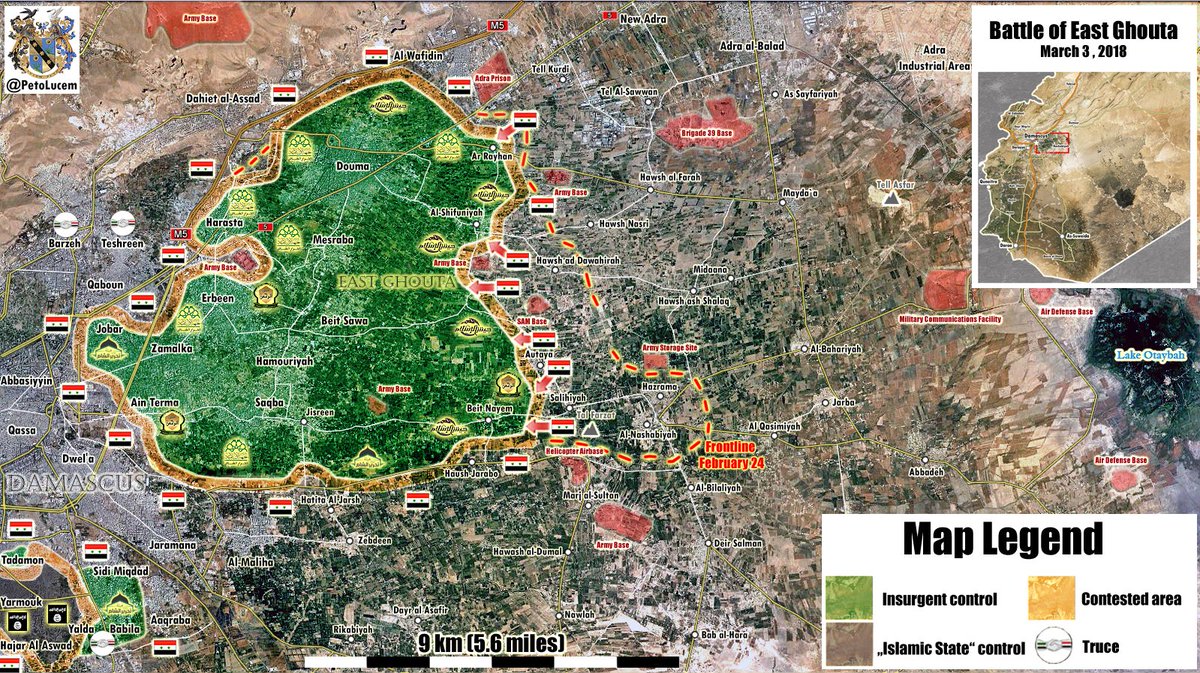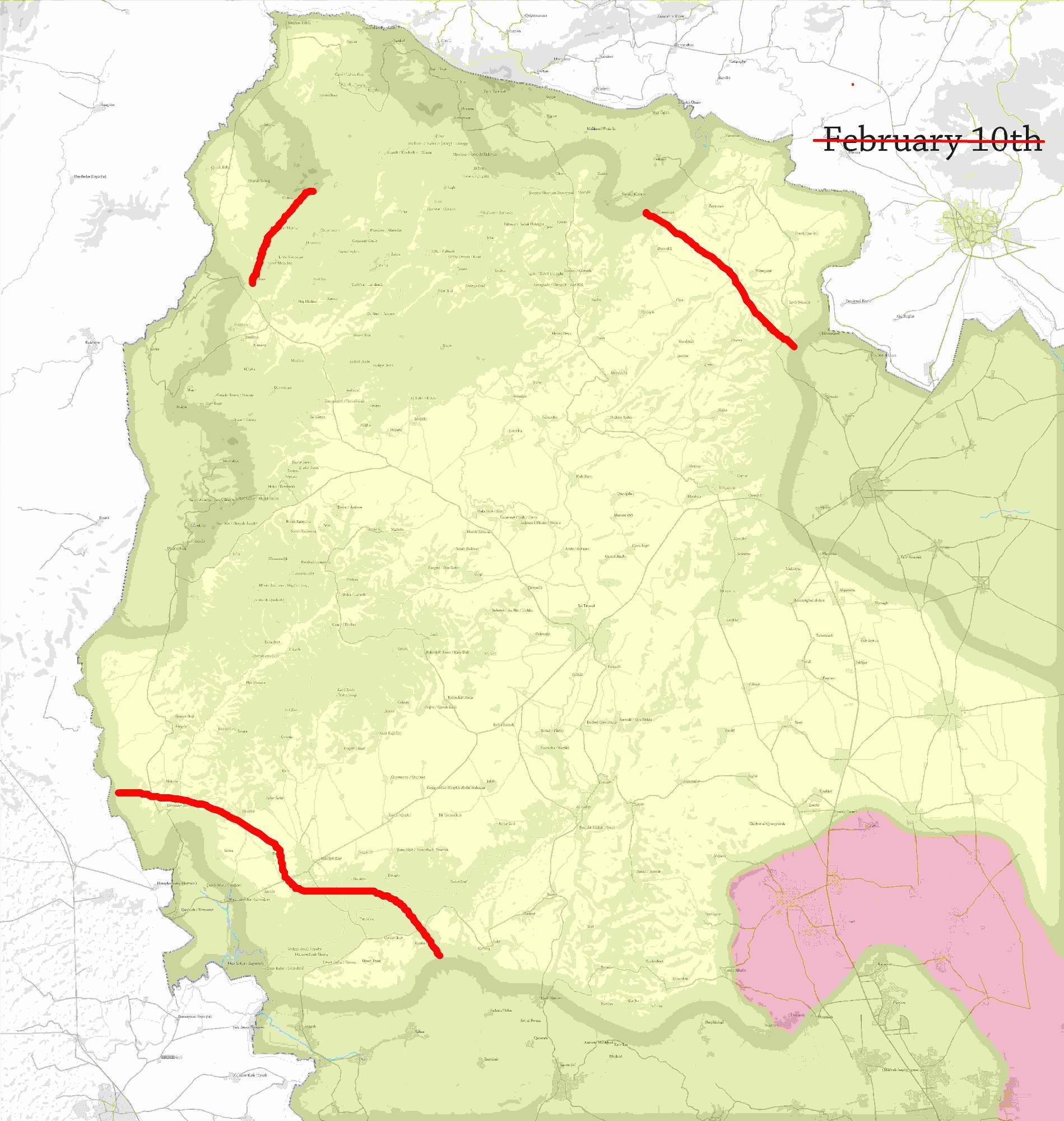Beijing sees a double opportunity in rebuilding the wartorn country: to extend its new Silk Road and expand its economic and political influence westward.
President Xi Jinping’s efforts to build a latter-day Silk Road have hit a roadblock: Syria’s seven-year civil war, which obstructs the crossroads to Eurasia, Africa, and the Middle East. So Beijing is vying to take the lead in rebuilding the war-torn country, even before the conflict has ceased.
In this, Xi is pushing against an open door. The Syrian government is
— in part to ensure its post-war sway over the battered country — but it needs international help with the estimated
price tag. As things stand, reconstruction will get little aid from the countries of the “Friends of Syria” coalition—notably the United States, Canada, and Britain—which have frozen
in pledged funding until a political transition “
” is on track. In the U.S., the proposed “
” would effectively prohibit financial assistance for reconstruction in areas under the control of the Syrian government.
This leaves the field open for non-Western investors, and indeed, last August’s Damascus Fair — the first held since war broke out in 2011 — attracted Chinese, Russian, and Iranian investors and businesses to explore projects and investment opportunities. The latter two countries are the Assad government’s largest supporters — Russia has spent nearly
on the war, while estimates of Iranian support run from $6 billion to $35 billion —but this very expenditure limits their ability to invest in reconstruction anytime soon.
With competition thus limited, China is poised to win substantial contracts and to expand its economic influence westward.
Beijing’s relatively impartial role in the conflict gives it a propitious opportunity to dominate reconstruction while maintaining a foot in negotiations over the political process. Since the beginning of the conflict, China has consistently
Security Council resolutions targeting Assad, insisting that Syria must shape its own political future. For this support—and,
, military assistance—the Assad government has openly welcomed Chinese investment and trade.
Over the past year, Chinese-Syrian negotiations over trade and investment expanded from early diplomatic exchanges to commitments of nearly $2 billion in reconstruction contracts. China has become Syria’s largest trade partner, snapping up
. In April, a Chinese delegation of investors led by Qin Yong of the Chinese Arab Exchange Association visited Homs and Damascus to
with senior ministers and leaders—the Investment department in the Prime Minister’s office, governor of Homs, President of the Syrian Central Bank, and the ministers of public works, economy and trade, and communications and technology. Their first visit stimulated conversations with potential Syrian partners, enabled Chinese investors to scout opportunities, and spawned two follow-on expeditions. These delegations paved the way for July’s “
,” hosted by the Syrian Embassy in Beijing and the Chinese-Arab Exchange Association. The event, which sought to foster 150 enterprises for a joint Syria industrial zone, drew about 1,000 Chinese investment and development firms. “Only China can play a leading role in helping Syria realize its reconstruction, ” Syria’s ambassador to Beijing, Imad Moustapha,
Chinese investors. Two months later, he
that Chinese businesses and companies would receive priority in the reconstruction.
What’s in it for China?
Syria is a geostrategic asset to China, rather than an economic one. Its resources, natural gas, and oil, are dwarfed by those of its regional neighbors in the Gulf, Iran, and Iraq, in whom China has already invested
. But Syria sits at the crossroads of branches of China’s Silk Road initiative, and provides the most direct land route to China’s energy and resource investments in the Gulf and Africa. Because of these past and potential investments, Beijing also has an economic interest in stabilizing Syria and the region — and possibly in military and counter-terrorism partnerships with Damascus, Tehran, and Moscow.
But Beijing’s interests in tamping down terrorism is not just economic. Syria’s conflicted northwest region provides safe haven for some
who are fighting alongside radical groups — and who may cause further instability in the Muslim-dominated Xinjiang province. China may launch reconstruction efforts in northwest Syria to shrink the sanctuary available to these groups. However, this will be challenging since the Syrian government is responsible for a significant proportion of the destruction and neglect that produced these communities.
China believe Assad and his backers in Russian and Iran are the best partners for accomplishing its strategic priorities in Syria: fighting terrorism and
or Islamist government from rising to power. China is drawing itself into an extensive East-West power struggle—Russia and Iran against the United States and Europe—for political, economic, and military influence in Syria and the broader Middle East. The West’s insistence on a political transition that does not include Assad and fears of growing Iranian influence will result in an extended military presence (and
) north of the Euphrates to counter Russian, Syrian, and Iranian forces. China’s grand entrance to Syria involvement would give Assad the advantage of developing territory under his control more quickly while the periphery is left in ruins. The United States and the anti-Assad coalition would likely be responsible for developing the remaining areas, many of which were recaptured from the so-called Islamic State.
China’s engagement in Syria is expanding an already messy proxy war for control of post-conflict Syria. While China maintains that it acts impartially in Syria, their investment in rebuilding Syria only bolsters the Assad government and heightens international competition over Syria’s future. Such a move could result in the de-facto partition of Syria and return Syria to its pre-war unevenly- developed status—a rich, powerful Damascus and a poor, weak periphery.
China and the United States could take steps to prevent Syria from sliding backwards economically and preventing Syria from unbalanced development. First, China and the United States can work together to pressure state actors in Syria and their partners to bring the opposition and the government to the table. Russia’s attempts to solve Syria diplomatically via the Astana Process have not produced a meaningful path toward a political transition. Both China and the U.S. can leverage reconstruction assistance as a tool for jumpstarting talks between both parties. This would remove Russian autonomy over the peace process. Second, China and the United States can convene multitrack dialogues on development in Syria with various stakeholders to ensure reconstruction is consistent across the country.
China could be the hope for rebuilding Syria. But with Assad in power, the chance of renewed violence is just below the surface. Until a political settlement is reached, Syria remains a battle ground for regional dominance with China, Russia, Iran, the United States, Turkey, and the Gulf all fighting for a chunk. But China’s assistance could tip the scale toward Assad.




